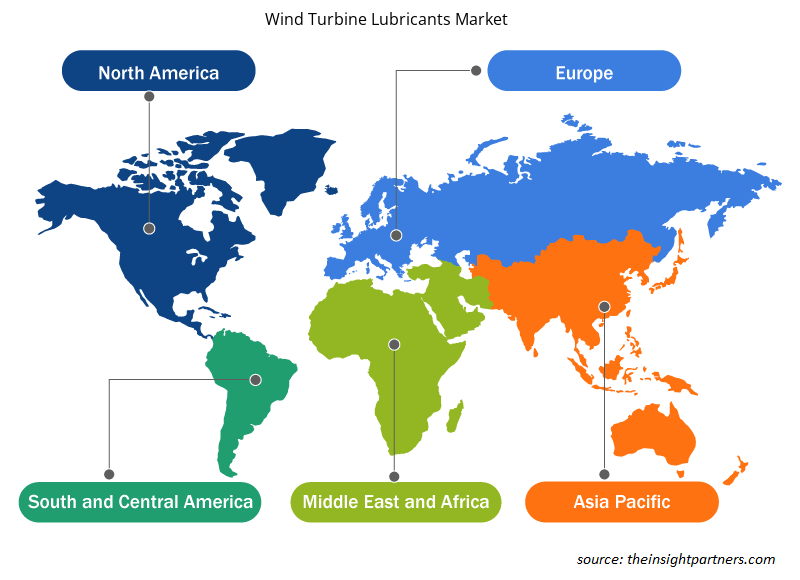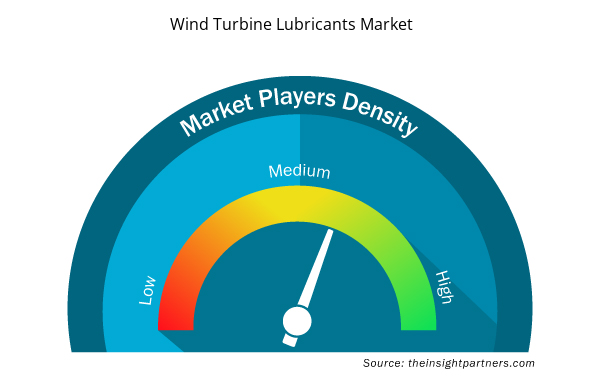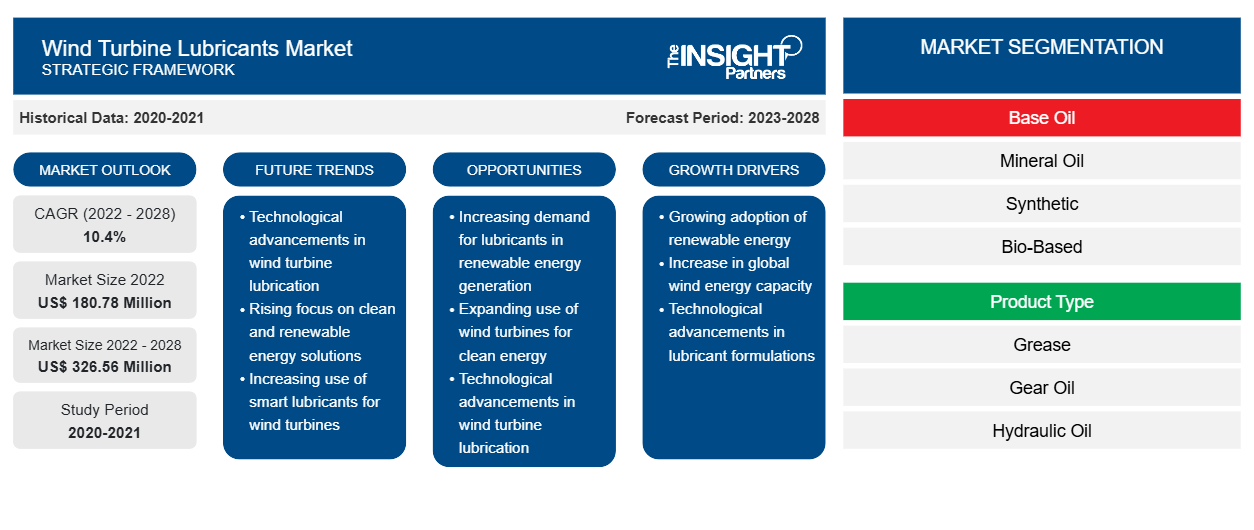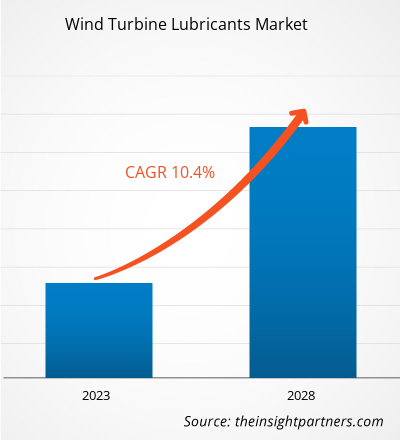[研究报告] 风力涡轮机润滑油 市场规模预计将从 2022 年的 1.8078 亿美元增长到 2028 年的 3.2656 亿美元;预计 2022 年至 2028 年的复合年增长率为 10.4%。
风力涡轮机润滑油在风力发电场设备的运行、维护和可靠性方面发挥着重要作用。风力涡轮机有各种润滑点,如变速箱、开式齿轮、变桨齿轮、变桨轴承、偏航轴承、液压系统和发电机轴承。风力涡轮机中使用的不同润滑剂是齿轮油、液压油和润滑脂。齿轮油用于润滑变速箱。在风力涡轮机中,润滑脂用于主转子轴承、偏航轴承、变桨驱动齿轮、叶片轴承和发电机轴承。
2022 年,亚太地区的全球 风力涡轮机润滑油市场份额最大。亚太地区的风力涡轮机润滑油市场分为澳大利亚、中国、印度、日本、韩国和亚太地区其他地区。中国是该地区市场增长的主要贡献者。十多年来,中国一直是全球最大、增长最快的可再生能源生产国。此外,它拥有世界上最大的风能市场。受上网电价 (FiT) 削减的推动,中国在 2020 年仍然是全球最大的新增陆上风电市场。由于国家和州政府采取了各种有利的政策和法规,印度的风电行业也取得了显着增长。此外,台湾、韩国、越南和菲律宾等国家也在采取各种举措来进一步提高其风电装机容量,这增加了该地区对风力涡轮机润滑油的需求。
定制此报告以满足您的需求
您可以免费定制任何报告,包括本报告的部分内容、国家级分析、Excel 数据包,以及为初创企业和大学提供优惠和折扣
- 获取此报告的关键市场趋势。这个免费样品将包括数据分析,从市场趋势到估计和预测。
COVID-19 疫情对风力涡轮机润滑油市场的影响
政府对可再生能源的支持和风力涡轮机安装量的增加是风力涡轮机润滑油市场增长的主要推动力。然而,在 2020 年,由于国家和国际边界的限制导致价值链中断,各行业不得不放慢运营速度。这导致生产设施关闭,对 2020 年初的风力涡轮机润滑油市场增长产生了负面影响。2020 年初风力涡轮机安装量的下降阻碍了对风力涡轮机润滑油的需求。
然而,随着成熟和新兴风电市场开始克服疫情的影响,风能行业在下半年强劲反弹。此外,随着各国政府宣布放宽社会限制,全球市场开始从疫情初期造成的损失中恢复。疫苗接种率的上升为工业发展创造了有利环境。全球风能理事会的数据显示,2020 年全球风电行业同比增长 53%,创历史新高。尽管全球供应链和项目建设中断,但该行业在 COVID-19 疫情高峰期安装了超过 93 吉瓦的风电。风电装机容量的激增导致对风力涡轮机润滑油的需求增加,因为润滑油用于润滑风力涡轮机的不同部件。
市场洞察
风电装机容量增加带动风力涡轮机润滑油需求
风能有助于减少对化石燃料的依赖,这导致不同国家对这种可再生资源的兴趣日益浓厚。根据全球风能理事会发布的《2021年全球风能报告》,2020年,新增风电装机容量超过90吉瓦,比2019年新增容量高出53%。这使得全球总装机容量达到743吉瓦,比2019年增长14% 。 2020年,陆上风电场的新增装机容量达到86.9吉瓦,海上风电场的新增装机容量达到6.1吉瓦,使2020年分别成为历史上陆上和海上风电新增装机容量最高的一年和第二高的一年。风力涡轮机的各个部件都需要使用油脂、齿轮油、液压油和其他润滑剂进行润滑。因此,全球风电装机容量的增加正在推动风力涡轮机润滑油市场的增长。
基础油洞察
根据基础油,全球风力涡轮机润滑油市场分为矿物油、合成油和生物基油。合成油在 2022 年占据了风力涡轮机润滑油最大的市场份额。合成润滑油由通过几种明确定义的化合物反应合成制造的油成分制成,这些化合物通常是石油基的,而不是从现有的石油原油或植物油中提炼出来的。合成润滑油是风力涡轮机行业最常用的润滑油,因为合成油的倾点较低,这使得变速箱能够在较低温度下高效运行。
全球风力涡轮机润滑油市场的主要参与者包括道达尔能源公司、埃克森美孚公司、福斯公司、英国石油公司、克鲁勃润滑剂公司、壳牌公司、菲利普斯 66 公司、雪佛龙公司、雅富顿化学公司、安索公司和路博润公司。全球市场参与者专注于提供高质量的产品以满足客户需求。为此,他们在研发活动上投入了大量资金。
报告亮点
- 风力涡轮机润滑油市场的渐进式行业趋势可帮助参与者制定有效的长期战略
- 发达市场和发展中市场采用的业务增长战略
- 2020 年至 2028 年风力涡轮机润滑油市场定量分析
- 全球风力涡轮机润滑油需求量估计
- 波特五力分析说明了行业内买家和供应商的效力
- 了解竞争市场状况的最新发展
- 市场趋势和前景,以及推动和抑制风力涡轮机润滑油市场增长的因素
- 通过强调支撑商业利益的市场策略来协助决策过程,从而促进市场增长
- 风力涡轮机润滑油市场规模在不同节点
- 市场详细概述和细分,以及风力涡轮机润滑油行业动态
- 各地区风力涡轮机润滑油市场规模及增长机遇
风力涡轮机润滑油市场区域洞察
Insight Partners 的分析师已详尽解释了预测期内影响风力涡轮机润滑油市场的区域趋势和因素。本节还讨论了北美、欧洲、亚太地区、中东和非洲以及南美和中美洲的风力涡轮机润滑油市场细分和地理位置。

- 获取风力涡轮机润滑油市场的区域特定数据
风力涡轮机润滑油市场报告范围
| 报告属性 | 细节 |
|---|---|
| 2022 年市场规模 | 1.8078亿美元 |
| 2028 年市场规模 | 3.2656亿美元 |
| 全球复合年增长率(2022 - 2028) | 10.4% |
| 史料 | 2020-2021 |
| 预测期 | 2023-2028 |
| 涵盖的领域 | 按基础油分类
|
| 覆盖地区和国家 | 北美
|
| 市场领导者和主要公司简介 |
|
风力涡轮机润滑油市场参与者密度:了解其对业务动态的影响
风力涡轮机润滑油市场正在快速增长,这得益于终端用户需求的不断增长,而这些需求又源于消费者偏好的不断变化、技术进步以及对产品优势的认识不断提高等因素。随着需求的增加,企业正在扩大其产品范围,进行创新以满足消费者的需求,并利用新兴趋势,从而进一步推动市场增长。
市场参与者密度是指在特定市场或行业内运营的企业或公司的分布情况。它表明在给定市场空间中,相对于其规模或总市场价值,有多少竞争对手(市场参与者)存在。
在风力涡轮机润滑油市场运营的主要公司有:
- 道达尔能源公司
- 英国石油公司
- 雪佛龙
- 埃克森美孚公司
- 福斯石油润滑油有限公司
免责声明:上面列出的公司没有按照任何特定顺序排列。

- 了解风力涡轮机润滑油市场的主要参与者概况
风力涡轮机润滑油市场
根据基础油,风力涡轮机润滑油市场分为矿物油、合成油和生物基油。全球风力涡轮机润滑油市场根据产品类型分为润滑脂、齿轮油、液压油和其他。
公司简介
- 道达尔能源公司
- 英国石油公司
- 雪佛龙
- 埃克森美孚公司
- 福斯石油润滑油有限公司
- 克鲁勃润滑剂有限公司
- 菲利普斯 66 公司
- 壳牌公司
- 路博润公司
- 雅富顿化学公司
- 安索公司
- 历史分析(2 年)、基准年、预测(7 年)及复合年增长率
- PEST 和 SWOT 分析
- 市场规模价值/数量 - 全球、区域、国家
- 行业和竞争格局
- Excel 数据集



Report Coverage
Revenue forecast, Company Analysis, Industry landscape, Growth factors, and Trends

Segment Covered
This text is related
to segments covered.

Regional Scope
North America, Europe, Asia Pacific, Middle East & Africa, South & Central America

Country Scope
This text is related
to country scope.
常见问题
Asia Pacific is estimated to register the fastest CAGR in the global wind turbine lubricants market over the forecast period. The increasing installed wind capacity in China, Japan, India, and Australia, among others, are driving the demand for wind turbine lubricants in Asia Pacific.
The gear oil segment held the largest share of the global wind turbine lubricants market in 2022. Gear oil is one of the most widely used wind turbine lubricants. It is used in lubricating gearboxes. Enclosed gearboxes are an important component in the nacelles of many wind turbines.
The projected growth of the market is attributed to the increasing installed wind capacity and government initiatives for the development of the wind energy sector.
The key players operating in the global wind turbine lubricants market include TotalEnergies, Exxon Mobil Corporation, FUCHS, BP p.l.c., Klüber Lubrication, Shell, Phillips 66 Company, Chevron, Afton Chemical, AMSOIL INC., and The Lubrizol Corporation.
In 2022, Asia Pacific held the largest share of the global wind turbine lubricants market. China is a major contributor to the market growth in Asia Pacific. The country has the world’s largest wind energy market. China remained the world’s largest market for new onshore additions in 2020, driven by the feed-in tariff cut-off. India also records the remarkable growth of the wind power industry due to policies and regulations adopted by the union and state governments.
The synthetic segment held the largest share in the global wind turbine lubricants market in 2022. Synthetic lubricants are made of oil components that have been manufactured synthetically by reaction of a few well-defined chemical compounds. They are the most commonly used lubricants in the wind turbine industry as synthetic oils have a lower pour point, which enables the gearbox to operate efficiently at lower temperature.
Trends and growth analysis reports related to Chemicals and Materials : READ MORE..
The List of Companies - Wind Turbine Lubricants Market
- TotalEnergies SE
- BP p.l.c.
- Chevron
- Exxon Mobil Corporation
- FUCHS Petrolub SE
- Klüber Lubrication GmbH & Co.
- Phillips 66 Company
- Shell Plc
- The Lubrizol Corporation
- Afton Chemical
- AMSOIL INC.
The Insight Partners performs research in 4 major stages: Data Collection & Secondary Research, Primary Research, Data Analysis and Data Triangulation & Final Review.
- Data Collection and Secondary Research:
As a market research and consulting firm operating from a decade, we have published and advised several client across the globe. First step for any study will start with an assessment of currently available data and insights from existing reports. Further, historical and current market information is collected from Investor Presentations, Annual Reports, SEC Filings, etc., and other information related to company’s performance and market positioning are gathered from Paid Databases (Factiva, Hoovers, and Reuters) and various other publications available in public domain.
Several associations trade associates, technical forums, institutes, societies and organization are accessed to gain technical as well as market related insights through their publications such as research papers, blogs and press releases related to the studies are referred to get cues about the market. Further, white papers, journals, magazines, and other news articles published in last 3 years are scrutinized and analyzed to understand the current market trends.
- Primary Research:
The primarily interview analysis comprise of data obtained from industry participants interview and answers to survey questions gathered by in-house primary team.
For primary research, interviews are conducted with industry experts/CEOs/Marketing Managers/VPs/Subject Matter Experts from both demand and supply side to get a 360-degree view of the market. The primary team conducts several interviews based on the complexity of the markets to understand the various market trends and dynamics which makes research more credible and precise.
A typical research interview fulfils the following functions:
- Provides first-hand information on the market size, market trends, growth trends, competitive landscape, and outlook
- Validates and strengthens in-house secondary research findings
- Develops the analysis team’s expertise and market understanding
Primary research involves email interactions and telephone interviews for each market, category, segment, and sub-segment across geographies. The participants who typically take part in such a process include, but are not limited to:
- Industry participants: VPs, business development managers, market intelligence managers and national sales managers
- Outside experts: Valuation experts, research analysts and key opinion leaders specializing in the electronics and semiconductor industry.
Below is the breakup of our primary respondents by company, designation, and region:

Once we receive the confirmation from primary research sources or primary respondents, we finalize the base year market estimation and forecast the data as per the macroeconomic and microeconomic factors assessed during data collection.
- Data Analysis:
Once data is validated through both secondary as well as primary respondents, we finalize the market estimations by hypothesis formulation and factor analysis at regional and country level.
- Macro-Economic Factor Analysis:
We analyse macroeconomic indicators such the gross domestic product (GDP), increase in the demand for goods and services across industries, technological advancement, regional economic growth, governmental policies, the influence of COVID-19, PEST analysis, and other aspects. This analysis aids in setting benchmarks for various nations/regions and approximating market splits. Additionally, the general trend of the aforementioned components aid in determining the market's development possibilities.
- Country Level Data:
Various factors that are especially aligned to the country are taken into account to determine the market size for a certain area and country, including the presence of vendors, such as headquarters and offices, the country's GDP, demand patterns, and industry growth. To comprehend the market dynamics for the nation, a number of growth variables, inhibitors, application areas, and current market trends are researched. The aforementioned elements aid in determining the country's overall market's growth potential.
- Company Profile:
The “Table of Contents” is formulated by listing and analyzing more than 25 - 30 companies operating in the market ecosystem across geographies. However, we profile only 10 companies as a standard practice in our syndicate reports. These 10 companies comprise leading, emerging, and regional players. Nonetheless, our analysis is not restricted to the 10 listed companies, we also analyze other companies present in the market to develop a holistic view and understand the prevailing trends. The “Company Profiles” section in the report covers key facts, business description, products & services, financial information, SWOT analysis, and key developments. The financial information presented is extracted from the annual reports and official documents of the publicly listed companies. Upon collecting the information for the sections of respective companies, we verify them via various primary sources and then compile the data in respective company profiles. The company level information helps us in deriving the base number as well as in forecasting the market size.
- Developing Base Number:
Aggregation of sales statistics (2020-2022) and macro-economic factor, and other secondary and primary research insights are utilized to arrive at base number and related market shares for 2022. The data gaps are identified in this step and relevant market data is analyzed, collected from paid primary interviews or databases. On finalizing the base year market size, forecasts are developed on the basis of macro-economic, industry and market growth factors and company level analysis.
- Data Triangulation and Final Review:
The market findings and base year market size calculations are validated from supply as well as demand side. Demand side validations are based on macro-economic factor analysis and benchmarks for respective regions and countries. In case of supply side validations, revenues of major companies are estimated (in case not available) based on industry benchmark, approximate number of employees, product portfolio, and primary interviews revenues are gathered. Further revenue from target product/service segment is assessed to avoid overshooting of market statistics. In case of heavy deviations between supply and demand side values, all thes steps are repeated to achieve synchronization.
We follow an iterative model, wherein we share our research findings with Subject Matter Experts (SME’s) and Key Opinion Leaders (KOLs) until consensus view of the market is not formulated – this model negates any drastic deviation in the opinions of experts. Only validated and universally acceptable research findings are quoted in our reports.
We have important check points that we use to validate our research findings – which we call – data triangulation, where we validate the information, we generate from secondary sources with primary interviews and then we re-validate with our internal data bases and Subject matter experts. This comprehensive model enables us to deliver high quality, reliable data in shortest possible time.


 获取此报告的免费样本
获取此报告的免费样本